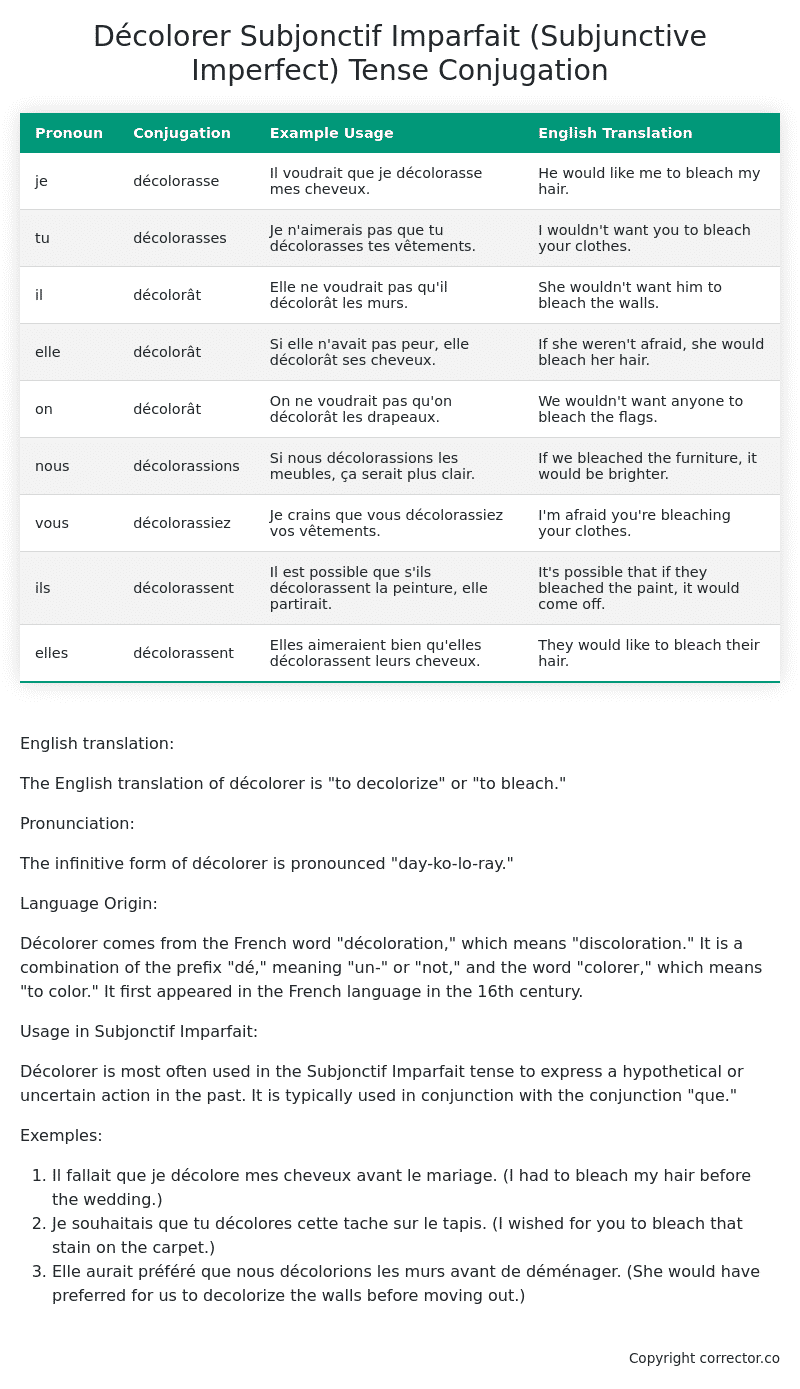Subjonctif Imparfait (Subjunctive Imperfect) Tense Conjugation of the French Verb décolorer
Introduction to the verb décolorer
English translation:
The English translation of décolorer is “to decolorize” or “to bleach.”
Pronunciation:
The infinitive form of décolorer is pronounced “day-ko-lo-ray.”
Language Origin:
Décolorer comes from the French word “décoloration,” which means “discoloration.” It is a combination of the prefix “dé,” meaning “un-” or “not,” and the word “colorer,” which means “to color.” It first appeared in the French language in the 16th century.
Usage in Subjonctif Imparfait:
Décolorer is most often used in the Subjonctif Imparfait tense to express a hypothetical or uncertain action in the past. It is typically used in conjunction with the conjunction “que.”
Exemples:
- Il fallait que je décolore mes cheveux avant le mariage. (I had to bleach my hair before the wedding.)
- Je souhaitais que tu décolores cette tache sur le tapis. (I wished for you to bleach that stain on the carpet.)
- Elle aurait préféré que nous décolorions les murs avant de déménager. (She would have preferred for us to decolorize the walls before moving out.)
Table of the Subjonctif Imparfait (Subjunctive Imperfect) Tense Conjugation of décolorer
| Pronoun | Conjugation | Example Usage | English Translation |
|---|---|---|---|
| je | décolorasse | Il voudrait que je décolorasse mes cheveux. | He would like me to bleach my hair. |
| tu | décolorasses | Je n’aimerais pas que tu décolorasses tes vêtements. | I wouldn’t want you to bleach your clothes. |
| il | décolorât | Elle ne voudrait pas qu’il décolorât les murs. | She wouldn’t want him to bleach the walls. |
| elle | décolorât | Si elle n’avait pas peur, elle décolorât ses cheveux. | If she weren’t afraid, she would bleach her hair. |
| on | décolorât | On ne voudrait pas qu’on décolorât les drapeaux. | We wouldn’t want anyone to bleach the flags. |
| nous | décolorassions | Si nous décolorassions les meubles, ça serait plus clair. | If we bleached the furniture, it would be brighter. |
| vous | décolorassiez | Je crains que vous décolorassiez vos vêtements. | I’m afraid you’re bleaching your clothes. |
| ils | décolorassent | Il est possible que s’ils décolorassent la peinture, elle partirait. | It’s possible that if they bleached the paint, it would come off. |
| elles | décolorassent | Elles aimeraient bien qu’elles décolorassent leurs cheveux. | They would like to bleach their hair. |
Other Conjugations for Décolorer.
Le Present (Present Tense) Conjugation of the French Verb décolorer
Imparfait (Imperfect) Tense Conjugation of the French Verb décolorer
Passé Simple (Simple Past) Tense Conjugation of the French Verb décolorer
Passé Composé (Present Perfect) Tense Conjugation of the French Verb décolorer
Futur Simple (Simple Future) Tense Conjugation of the French Verb décolorer
Futur Proche (Near Future) Tense Conjugation of the French Verb décolorer
Plus-que-parfait (Pluperfect) Tense Conjugation of the French Verb décolorer
Passé Antérieur (Past Anterior) Tense Conjugation of the French Verb décolorer
Futur Antérieur (Future Anterior) Tense Conjugation of the French Verb décolorer
Subjonctif Présent (Subjunctive Present) Tense Conjugation of the French Verb décolorer
Subjonctif Passé (Subjunctive Past) Tense Conjugation of the French Verb décolorer
Subjonctif Imparfait (Subjunctive Imperfect) Tense Conjugation of the French Verb décolorer (this article)
Subjonctif Plus-que-parfait (Subjunctive Pluperfect) Tense Conjugation of the French Verb décolorer
Conditionnel Présent (Conditional Present) Tense Conjugation of the French Verb décolorer
Conditionnel Passé (Conditional Past) Tense Conjugation of the French Verb décolorer
L’impératif Présent (Imperative Present) Tense Conjugation of the French Verb décolorer
L’infinitif Présent (Infinitive Present) Tense Conjugation of the French Verb décolorer
Struggling with French verbs or the language in general? Why not use our free French Grammar Checker – no registration required!
Get a FREE Download Study Sheet of this Conjugation 🔥
Simply right click the image below, click “save image” and get your free reference for the décolorer Subjonctif Imparfait tense conjugation!

Décolorer – About the French Subjonctif Imparfait (Subjunctive Imperfect) Tense
Formation
Common Everyday Usage Patterns
Interactions with Other Tenses
Subjonctif Présent
Indicatif Passé Composé
Conditional
Conditional Perfect
Summary
I hope you enjoyed this article on the verb décolorer. Still in a learning mood? Check out another TOTALLY random French verb conjugation!


